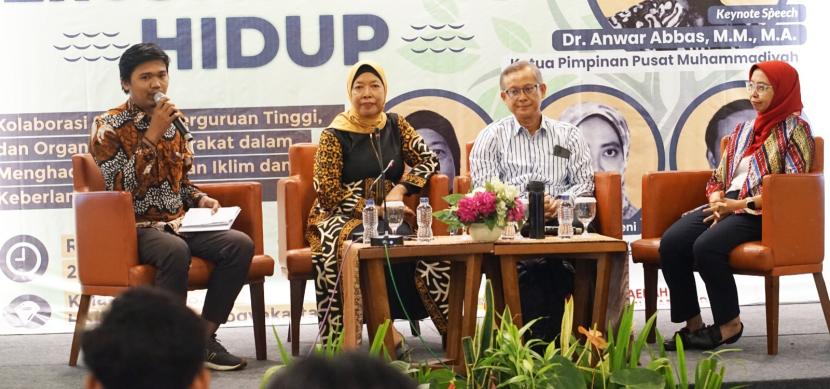REPUBLIKA.CO.ID, YOGYAKARTA — The increase in temperature and extreme weather that has recently occurred in almost all parts of the world is due to climate change. If left to do so, this has very fatal consequences for the survival of living things on earth, such as declining quality of clean water, reduced oxygen, increased potential for the spread of diseases caused by viruses and bacteria,
to triggering natural disasters.
For this, cooperation of all parties is needed to address environmental problems, not only universities, community organizations and business operators, but also society, especially the younger generation. This was highlighted in the discussion on Environment; Collaboration of Private, Higher Education, Community Organizations in Confronting Climate Change organized by the Student Association of Muhammadiyah (IMM) DIY on Wednesday (22/11/2023).
Deputy Chairman of the Muhammadiyah Central Leadership Environment Assembly Prof. Muhammad Nurcholis affirmed that Muhammadiyah as a movement and organization has full attention to climate change. How our climate is today not only affects flora and fauna, but also determines human health.
“That's why real action is needed to safeguard the climate by curbing carbon emissions. We must jointly carry out such collaboration and then the government's policy, which is how to increase this climate resilience,” Nurcholis said in a release received by Republika on Friday (24/11/2023).
Nurcholis further explained that Muhammadiyah has a strong commitment to respond to and assess environmental issues, including those that are currently being crowded such as climate change. Muhammadiyah has created a basic concept to mitigate the rate of climate change in order to control it. Nurcholis also invites the younger generation to play an active role in tackling this climate change.
The younger generation must understand in practical terms the causes of climate change. Especially starting to do energy saving and using non-fossil energy such as solar energy, water, wind, biomass can be developed so that it is not too fast in exploiting carbon on earth.
“Since the more fossil energy is used, the more carbon is removed from the bowels of the earth, young people should understand this,” said Professor of Soil Science UPN 'Veteran' Yogyakarta and lecturer at the University of Muhammadiyah Yogyakarta (UMY).
Another speaker, Head of Climate and Water Stewardship Danone Indonesia, Ratih Anggraeni, said climate change is an issue that the current generation should be aware of, as it concerns the sustainability of the earth
.
“Environmental education should be done as early as possible so as to encourage young people to innovate to mitigate climate change. Thus we can mitigate this climate change more massively,” Ratih explained.
Danone Indonesia has made various efforts to maintain environmental sustainability as part of the company's vision, not only around factories but also elsewhere.
“We support net zero emissions by 2050 but between now and 2030 achieve our target of meeting the carbon footprint of operations significantly. Starting from the use of renewable energy, the reduction of fossil energy and ensuring products are produced through regenerative farming systems. The commodities used do not come from deforested land,” he said.
Danone Indonesia has since 2017 developed rooftop solar power plant (PLTSA) innovations in several factories and has a commitment to implement them in all its factories in Indonesia by 2025.
In addition, added Ratih, Danone strives to ensure the use of packaging contains recycled materials because otherwise it will contribute to greenhouse gas emissions. Then the logistics system should be more efficient and minimize waste. He hoped that a number of pro-environmental measures could be accompanied by a conducive climate to make it easier for industry to utilize renewable energy.
Another effort Danone has undertaken is to encourage efficient waste management initiatives. To this end, in addition to educating the public and supporting the development of waste banks around the plant, Danone also built an integrated waste management infrastructure (TPST).
“Because again, waste also contributes to greenhouse gases, especially when we see that food waste globally contributes about 12 percent of waste. In a landfill (landfill) for example, that food waste releases methane gas. Therefore, sorting out garbage can greatly help to lower greenhouse gas emissions,” Ratih said.
Professor of the University of Muhammadiyah Yogyakarta, Dra Mutia Hariati Hussin, pointed out the gap between the policy portion and the field application that raises issues in climate change mitigation in Indonesia.
“If in terms of its policies a lot has been produced and it seems that just to fulfill our obligations as a country that signs various environmental agreements we have a lot of variety, there are SDG's, MDGs,” Mutia said.
Mutia exemplifies that in the preparation of the Long Term Development Plan (RPJMP) for 2024-2045 there has not been any activity carried out by the community.
“Let us not lose another opportunity in that long-term program and do not create programs or policies that are beautiful by the state, but cannot be implemented by the grassroots,” Mutia said
.


